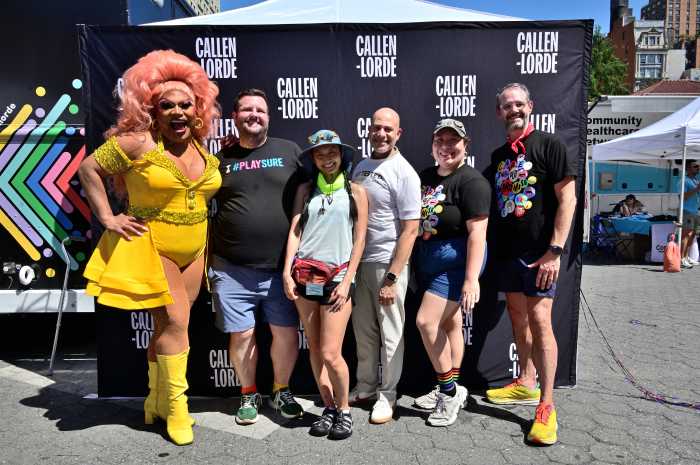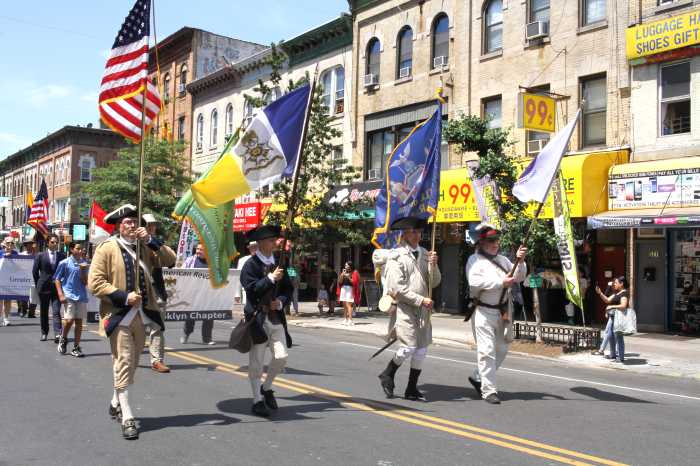Gay Men of African Descent's Tokes Osubu. | GMAD
While the City Council restored funding for HIV prevention contracts that the Bloomberg administration wanted to eliminate entirely, that funding once again was not made a permanent part of the New York City budget, requiring AIDS advocates to continue waging an annual fight for those dollars.
“A growing number of HIV/ AIDS programs that used to be ‘baselined’ in the mayor’s budget are now being restored with City Council discretionary funding that needs to be renewed every year, which is far from guaranteed given that every year there’s more and more programs that get cut from the mayor’s budget,” Sean Barry, a director at VOCAL-NY, a group that does political organizing among HIV-positive people, drugs users, and the formerly incarcerated, wrote in an email.
The city’s $68.5 billion budget for the 2013 fiscal year, which began on July 1, included $1.3 million in restorations, ranging from $40,000 to $190,000 for contracts with 17 AIDS groups.
In late 2011, the city’s Department of Health and Mental Hygiene (DOHMH) wrote to AIDS groups telling them that their HIV prevention contracts would be cut by 50 percent for the second half of the 2012 fiscal year. DOHMH relented after City Council Speaker Christine Quinn, an out lesbian who represents Chelsea, said it could not unilaterally make cuts to a budget that the Council passed and the mayor signed. The Council restored funds through the end of the 2012 calendar year when the contracts end.
“I am very pleased,” said Marjorie Hill, the chief executive officer of the Gay Men’s Health Crisis (GMHC). The agency got $88,000 for HIV prevention work and $200,000 to continue a program that helps people with HIV who have dementia or other cognitive problems manage their finances.
“I think that the real challenge is that there’s not enough money,” Hill said. “New York State and New York City are not receiving sufficient funds to support all of the HIV prevention and treatment work we need to do.”
Mayor Michael Bloomberg has consistently sought to cut HIV funds of all types. Bloomberg and the City Council have eliminated $19 million in HIV prevention dollars over the past five years. Only some of those dollars have been replaced, with AIDS groups relying on the City Council to use its discretionary funds. In what has become an annual battle, those groups compete with other interests for that cash.
“They are stop-gap measures, but it reflects the pretty limited power City Council has during the budget process,” Barry wrote. “The only long-term solution is getting the funding baselined again in either Bloomberg’s final budget or the next mayor’s budget, which should be one of the criteria by which any candidate’s HIV/ AIDS plan should be judged by the community.”
In addition to the HIV prevention contracts, the Council restored funds for supportive housing and food and nutrition programs for people with HIV.
One agency, Gay Men of African Descent (GMAD), did not see all of its funding restored for the remainder of 2012. GMAD has a $200,000 contract to run an anti-stigma campaign. That contract will now pay $150,000.
“It just says a lot about the value they attach to that. Stigma is not that important, which is very unfortunate,” said Tokes Osubu, GMAD’s executive director. The agency has an annual budget of roughly $1.3 million and has laid off one employee.
Since 2007, DOHMH has been reporting increases in new HIV infections among young gay and bisexual men, with new infections among African-American and Latino men driving those increases.
DOHMH is already rebidding the contracts that it earlier sought to cut. In June, Public Health Solutions, a non-profit that manages DOHMH’s portfolio of HIV prevention contracts, published a request for proposal (RFP) seeking bids. That RFP emphasizes that DOHMH wants to fund prevention programs that work with men who have sex with men (MSM) and transgender women.
Those two groups “account for a relatively small percentage” of the city’s population, but “these are the populations most severely impacted by HIV,” the RFP read.
While new HIV infections have decreased among most groups in the city, “new diagnoses among young MSM (ages 13-29) have been increasing in the last several years and comprised 49.3 percent of all new MSM diagnoses in NYC in 2010… Black and Latino MSM are at greatest risk, accounting for nearly seven out of 10 new HIV diagnoses among MSM in the city,” the RFP read.
The RFP cited a 2009 study that found that nearly half of the transgender women were HIV-positive, with nearly all of that due to high prevalence among African-American and Latina women.


































